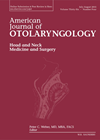
Journal Reviews
A systematic review of adjunctive probiotic therapy in the management of chronic rhinosinusitis
It is generally understood that administering substances containing live microbiologically active micro-organisms (probiotics) enhances the treatment of chronic rhinosinusitis. Probiotics manipulate and rebalance the alterations occurring in the local microbiome in chronic rhinosinusitis patients. This results in propagation of healthy...
The push towards scarless parotid surgery
When dealing with benign parotid pathology, high expectations are placed on the operating surgeon to preserve key neurovascular structures, especially the animating facial nerve, through meticulous dissection. With time, there has been a greater emphasis on improving cosmesis in parotid...
Pre-habilitation in head and neck cancer – a literature review to guide best practice
Curative treatment of head and neck cancer (HNC) often requires surgery; however, outcomes are impacted by the complexity of the surgery and the patient population. Increasingly ‘Enhanced Recovery After Surgery’ (ERAS) protocols are being used to maximise patient outcomes and...
Active surveillance for papillary thyroid cancers – what is the risk of progression?
Papillary thyroid cancers (PTCs) are generally considered to be indolent malignancies with favourable outcomes. Active surveillance (AS) has consequently been trialled as a management option for small PTCs with no evidence of regional lymph node involvement, especially papillary thyroid microcarcinomas...
Factors associated with laryngopharyngeal reflux
This Chinese cross-sectional survey across three hospitals and 320 patients looked at the effect of unhealthy lifestyles and eating habits, as well as psychological difficulties, on the development of laryngopharyngeal reflux (LPR). All the participants underwent gastroscopy, laryngoscopy and various...
Supracricoid laryngectomy revisited
In this article, the authors report on the long-term (five- and 10-year) survival, local recurrence rate and cause of death in a cohort of 46 patients with T3M0N0 glottic carcinoma undergoing supracricoid laryngectomy. The five- and 10-year survival were 78%...
Evolution of salivary gland pathology classifications
Targeted therapies for malignant salivary gland tumours have changed the treatment paradigm and therapy approaches. Better outcomes are now feasible. Choosing the treatment method requires a clear classification of the lesions. The authors of this paper reviewed the World Health...
Occurrence of cancer in asymmetrical tonsillar enlargement in adults
With significant increase in head and neck cancer in the last decade, attributed to HPV, fast-track referrals from primary care have markedly increased, adding further to the burden on the NHS. Whether or not unilateral tonsillar enlargement alone, without red...
Cervical tracheal reconstruction
This Chinese animal study looked at the use of a xenogenic acellular dermal matrix for tracheal reconstruction. The authors took a total of 22 rabbits and divided them into an experimental (repair with xenogenic acellular dermal matrix) and control group...
How long after head and neck cancer diagnosis do patients need opioids?
With the advances in the management of head and neck cancer (HNC), patients tend to survive longer after their diagnosis. These people face the burden of chronic pain management which is strongly associated with HNC. A HNC team in Portland...
A time-saving method for faster cancer diagnosis and treatment
One of the main impediments in achieving UK Government cancer diagnosis and treatment targets is lack of diagnostic capacity. An increase in head and neck cancers by 50% in the last five years has put on additional strain. In this...
Retrospective review of paediatric salivary gland tumours
As is the case with adults, primary tumours of the salivary glands in children comprise a heterogeneous collection of different histological types. This paper presents a retrospective review of primary salivary gland tumours in children treated over the course of...















